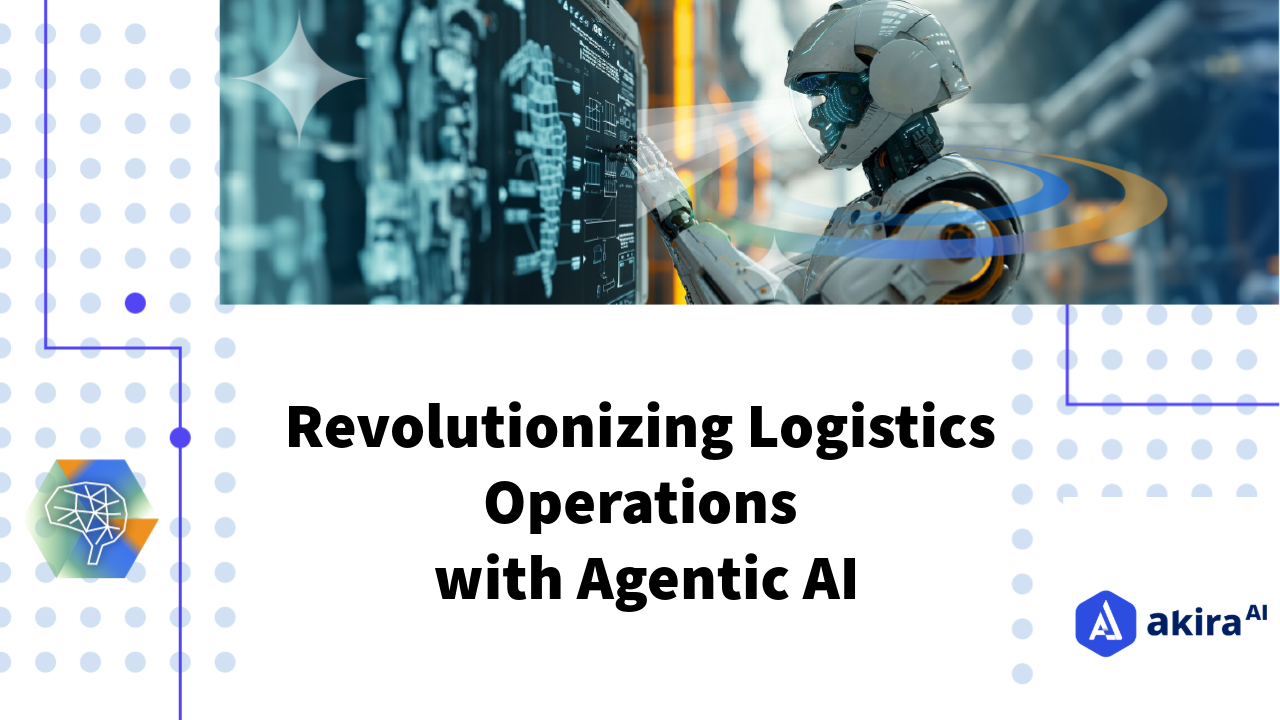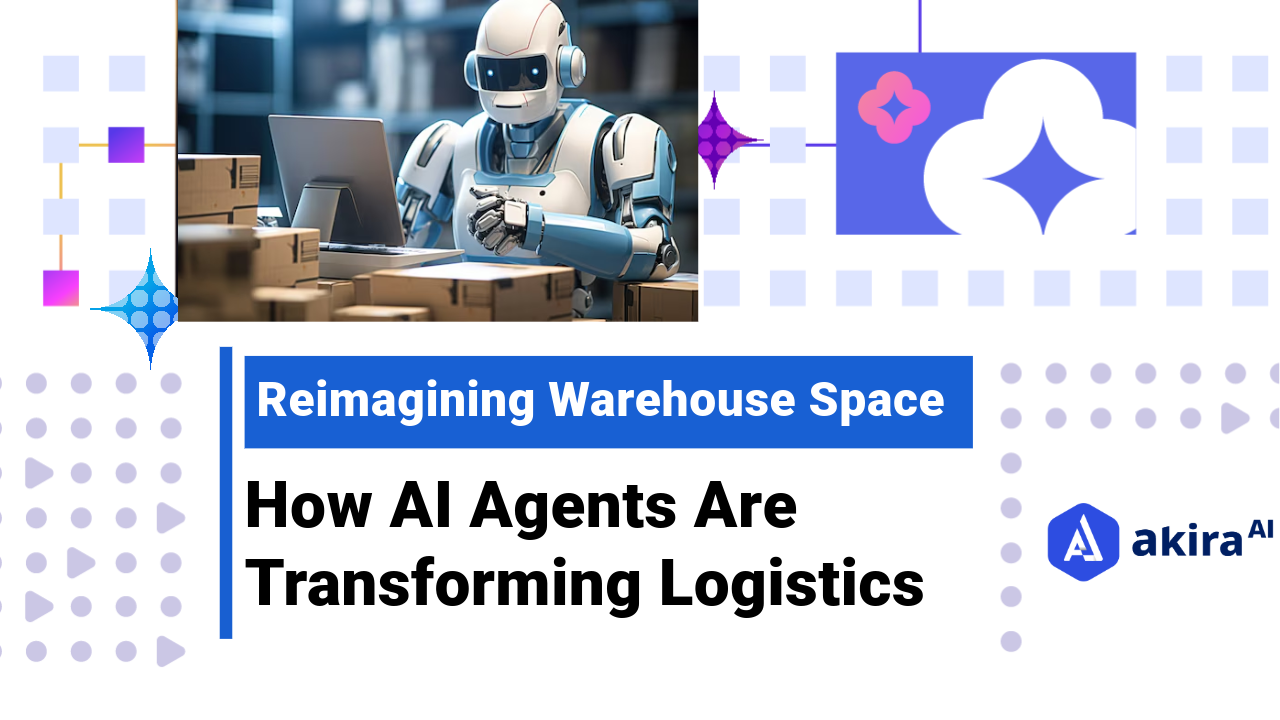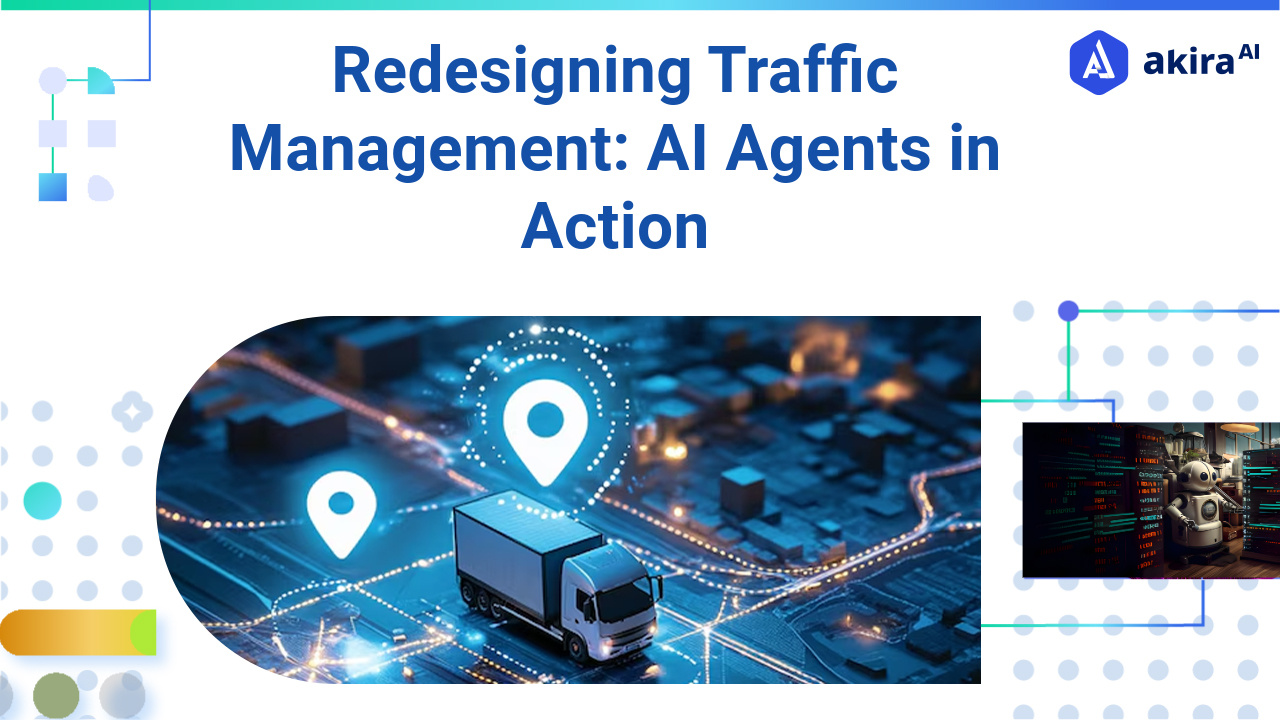Key Insights
-
Agentic AI Benefits: AI boosts efficiency, cuts costs, and enhances customer satisfaction through automation, route optimization, and real-time tracking.
-
AI Applications in Logistics: AI improves supply chain management, inventory, routes, maintenance, and customer support, enhancing overall operations.
-
Empowering Businesses: AI offers advanced analytics, smooth system integration, personalized services, and real-time support to improve productivity and customer relations.
-
Future Trends: AI will drive IoT integration, hyper-personalization, sustainability, and human-AI collaboration, making it essential for competitive advantage in logistics.

As the complexity of supply chains increases, logistics has become one of the sectors that is gaining a new round of development. Companies are trying to find new ways of managing supply chain costs while meeting their customers’ needs.
Thus, with the help of Agentic AI, it is possible to introduce highly effective and adaptive management solutions for the effective provision of logistical processes. This blog will focus on the types and examples of AI agents in the logistics industry, the potential advantages and disadvantages of AI, and the prognosis of future trends in AI technology adoption in the logistics industry.
Understanding the Need for Agentic AI in Logistics
Current challenges faced by logistics companies are multifaceted and complex, with volatility in market conditions, disruptions in supply chains, fluctuating demand, and the need for real-time supply chain information being among the most pressing issues. The unpredictability of global events, such as natural disasters or geopolitical tensions, can lead to significant delays and complications. Furthermore, the traditional logistics approaches—such as manual tracking and outdated inventory systems—are proving inadequate in effectively managing these challenges.
Agentic AI offers innovative solutions that can transform how logistics companies operate. By automating work processes, AI can streamline operations and reduce the risk of human error. This automation enables quicker response times to changing conditions, which is crucial in a fast-paced industry. Additionally, AI agents provide sophisticated data analysis, allowing organizations to gain deeper insights into their operations.
With the ability to process vast amounts of data, these agents help companies make informed decisions based on real-time information. This capability enhances operational efficiency and increases organizational flexibility, enabling logistics firms to adapt swiftly to dynamic market demands and ultimately improve their overall performance.
How Does Agentic AI Transform Logistics Providers and Customers?
For Businesses
-
Enhanced Efficiency: Automation transforms logistics by streamlining tasks like order processing and inventory management, minimizing errors, and boosting productivity. It also optimizes delivery routes based on factors such as traffic and weather conditions, ensuring timely and reliable shipments.
-
Cost Savings: Resource allocation is optimized to identify effective applications that reduce operational costs and enhance overall efficiency. Predictive maintenance, driven by vehicle performance data analysis, allows businesses to proactively address potential issues, significantly lowering repair expenses.
-
Data-Driven Decision-Making: Advanced analytics provide valuable insights into supply chain efficiency, enabling real-time decision-making. Machine learning excels in demand forecasting, helping companies anticipate customer needs and prevent stockouts, ensuring products are available when required.
-
Increased Agility: Rapid responses to changes allow businesses to adapt quickly to fluctuating demand and supply chain disruptions. The scalable nature of these solutions enables organizations to manage large volumes of data and complex transactions effortlessly, promoting growth and operational efficiency.
For Consumers
-
Real-Time Tracking: Another advantage of the distribution strategy is that consumers can monitor their orders in real-time to eliminate worry about delivery time.
-
Tailored Recommendations: Analyzing customer behavior allows for tailored product suggestions and instant promotions, enhancing the shopping experience.
-
Automated Updates: Customers get alerts on their orders as soon as they are shipped, and when they have been delivered.
-
24/7 Support: Smart self-service through AI chatbots support instant customer requests, enhancing satisfaction, and retention levels.
-
Proactive Problem Solving: AI can predict delivery problems and make its consumers aware of the same, solving the problem on the same
-
Simplified Processes: Efficient procurement orders and customer service lessen the number of hurdles consumers need to go through to obtain what they require.
Akira AI Multi-Agent In Action
-
Data Collection: AI agents acquire information from sources such as connected devices and sensors and customer interactions.
-
Analysis: The analysis of this data involves sophisticated algorithms to provide insights involving supply chain performance and consumption.
-
Decision-Making: AI agents are used to employ the finished model on predictive analytics for demand forecasts, optimal routes, and inventory control.
-
Execution: The tasks related to order’ handling, shipment tracking, and customer interactions are performed by AI systems, making the work smooth.
-
Predictive Analytics: AI agents utilize the analyzed data to perform predictive analytics. This includes forecasting demand, identifying optimal routes, and managing inventory levels effectively, enabling proactive planning and resource allocation.
-
Feedback Loop: The system incorporates a feedback loop where outcomes from executed actions are analyzed. This enables continuous improvement, as AI agents learn from past decisions and adjust strategies accordingly.
Exploring the Benefits of Agentic AI to the Logistics Sector
-
Cost Reduction: AI agents can minimize production costs and increase the level of profitability due to increased levels of operational automation.
-
Increased Flexibility: Apps powered by Artificial Intelligence can learn from environmental changes much faster than from an increasing or decreasing demand or a supply chain disruption.
-
Enhanced Visibility: Visibility in real time is resourceful to the managers of logistics since they get a holistic view of their operations.
-
Sustainability: Agentic AI helps businesses deliver goods faster and cut expenses it at the same time, therefore making the shipment eco-friendly.
-
Improved Customer Satisfaction: Through timely updates, accurate tracking, and tailored service provision, the AI agents complement the customer experience.
Applications of Agentic AI Across Logistics Operations

Fig 1: Applications of Agentic AI Across Logistics Operations
-
Supply Chain Optimization
Supply chain management and mechanisms are analyzed and controlled by AI agents, demand is predicted, and inventory management is improved to reduce supply costs and improve efficiency. -
Real-Time Shipment Tracking
AI agents give real-time updates on the shipment and help businesses and customers plan and act accordingly depending on the demanded shipment status. -
Automated Customer Support
The responses include addressing customer inquiries about order status, delivery fees, and delivery time through real-time communication, which enhances overall satisfaction.
-
Route and Load Optimization
These agents analyze traffic patterns, prevailing weather conditions, and delivery slots to recommend the most suitable routes simultaneously informing about the efficient load disposition of transport vehicles. -
Inventory Management
The AI-driven solutions help to automatically track inventory levels to ensure appropriate supply for all storage resources and repletion when necessary both in cases of stockouts and overstock. -
Predictive Maintenance
Agnetic AI-based system works on data generated by vehicles and makes preventive predictions on when such vehicles are due for a fix to prevent the chances of a delivery going up in smoke.
-
Fraud Detection and Risk Management
These agents look for unusual transactions and prevent fraudsters from attacking logistics operations and affecting the business.
-
Dynamic Pricing Strategies
This multi-agent system helps execute dynamic pricing solutions using market analysis, improving the revenue and the position of the company. -
Warehouse Automation
AI agents enhance operation efficiency in sorting, picking, and packing processes resulting in efficient order delivery.
-
Data Analytics and Reporting
The advanced analytics and reporting features of these agents allow logistics companies to derive meaningful insights from operational data in service of better decision-making. -
Vendor Management
These AI-based solutions manage efficient relationships and performance of supplier tenders to procure efficiently due to a reduction in time instabilities and communication façades. -
Human Resource Management
These agents control the organization’s workforce by offering services such as scheduling, performance monitoring, and interaction to advance employees’ interactions with the organization. -
Raw Material Sourcing
Agentic AI manages the procurement of raw materials by developing the demand forecast and appraising the performance of suppliers to identify the right time to source the materials at the right price. -
Improving Response to Cargo Theft
These agents use predictive analytics to provide better security, review real-time data, and resolve cases of stolen cargo.
-
Anomaly Detection and Fault Analysis
This AI-based system learns when there are problems with the supply chain and works to prevent them or improve their processes by analyzing existing data. -
Yield Loss Analysis
These agents evaluate areas that require improvement in the chain process to reduce yield loss and improve the bottom line and asset utilization.
-
Anomaly Detection
Anomaly detection agents monitor transactions to identify irregular patterns that may indicate fraudulent activity or financial misconduct. -
Automated Product Quality Assurance
AI agents employ strict quality assurance processes across the whole supply chain and quality optimization based on available data. -
Prescriptive Maintenance Modules
These agents offer a schedule for servicing various assets and can also analyze the performance trends for the same assets to predict when a particular asset would require servicing. -
Last-Mile Dispatch Solutions
Last-mile delivery processes are supported by AI-based agents to increase the organization of routes to delivery personnel and their relationships. -
Order Management
AI agents streamline order processing by managing everything from order entry to dispatch. This automation enhances efficiency and reduces the likelihood of errors throughout the entire fulfillment process.
-
Fleet Management These agents monitor performance information about these modes of transport and achieve enhanced usage of transport assets in terms of routing and cost.
Steps for Suppliers to Get Agentic AI-Ready
.jpg?width=1920&height=1080&name=Path%20To%20Precision%20Medicine%20(3).jpg)
Fig 2: Steps for suppliers to get Agentic AI-Ready
-
Review Current Technology: Audit the existing flow to understand where within the existing supply chain structures AI can be implemented.
-
Stating Goals: Explain in simple terms and in straightforward language what it is that the organization wants Agentic AI to deliver.
-
Infrastructural Investment: Modify the technology support of the supply chain for accommodating the AI agents.
-
Collect Quality Data: Ensure data collection through the right techniques that reflect customer behavior and operational performance.
-
Train Employees: Make sure that the correct employees with adequate expertise are going to work with AI applications.
-
Pilot Projects: Try the small-scale AI projects before taking them to full scale so that if they don’t work or require tweaking, they can be done.
Empowering Businesses with Agentic AI Solutions
-
Advanced Analytics: Complex algorithms convert received data into actionable insights. This approach, particularly through prescriptive analytics, allows logistics companies to gain tailored insights into customer behavior patterns and trends, enhancing their planning strategies and operational activities.
-
Seamless Integration: Logistics organizations can incorporate top-notch AI solutions into their existing systems without major restructuring or additional infrastructure investments. This capability enhances operational efficiency while maximizing the value of current assets. The seamless integration with existing software and hardware provides new features that boost productivity.
-
Personalization: By leveraging data analysis, businesses can enhance customer interactions with tailored communication and services. This level of personalization ensures that recommendations and support align with customer preferences, helping to build stronger relationships and improve satisfaction levels, ultimately driving sales.
-
Automated Workflows: Automation streamlines mundane tasks, allowing employees to focus on more innovative and decision-making projects. This shift reduces operational costs and accelerates processes, freeing up valuable time and enhancing overall team efficiency and creativity.
-
Real-Time Support: Quick support solutions enable efficient handling of customer inquiries and operational issues. In today's fast-paced environment, timely assistance is crucial for maintaining customer satisfaction and gaining a competitive edge in the market.
Future Trends in Logistics of Agentic AI
-
Increased Interconnection with IoT: Increased interfacing of AI with gadgets or IoT will ensure that AI agents help in interpreting actual data and making preventive decisions.
-
Hyper-personalization: True fulfillment of highly customized logistics will become a norm as agentic AI normalizes, allowing the customer to have their needs met as a unique individual.
-
Sustainability Initiatives: Agentic AI will be one of the driving forces in achieving proper optimization of supply chains to increase the environment’s sustainability.
-
Increased Collaboration: AI agents will enable human and AI companies to work in conjunction hence, enabling teams to tap into the abilities of human and artificial intelligence.
-
Accountable Practices in AI: More responsible AI, which enables the proper use of data in firms, will be needed because of the increasing application of AI in firms.
Conclusion: AI Agents for Logistics
Agentic AI has added significant value to the sector and has revolutionized the entire business structure of the logistics industry. Competition in the business will mostly be determined by the acceptance and incorporation of artificial intelligence agents as micro details of the supply chain evolve. Conveying inputs in an unbroken, dynamic process of evolution via innovation makes AI-driven logistics solutions mandatory for the future. These technologies will be adopted by the firms and ensure that the face-changing aspect of logistics is solved in satisfying the consumer needs in the fast-growing market.
Next Steps in Logistics Operations
Talk to our experts about implementing an Agentic AI system and discover how industries and logistics departments can leverage Agentic Workflows and Decision Intelligence to become decision-centric. Harness AI to automate and optimize supply chain processes, enhance real-time tracking, improve route planning, and streamline operations, revolutionizing efficiency and responsiveness in logistics.

